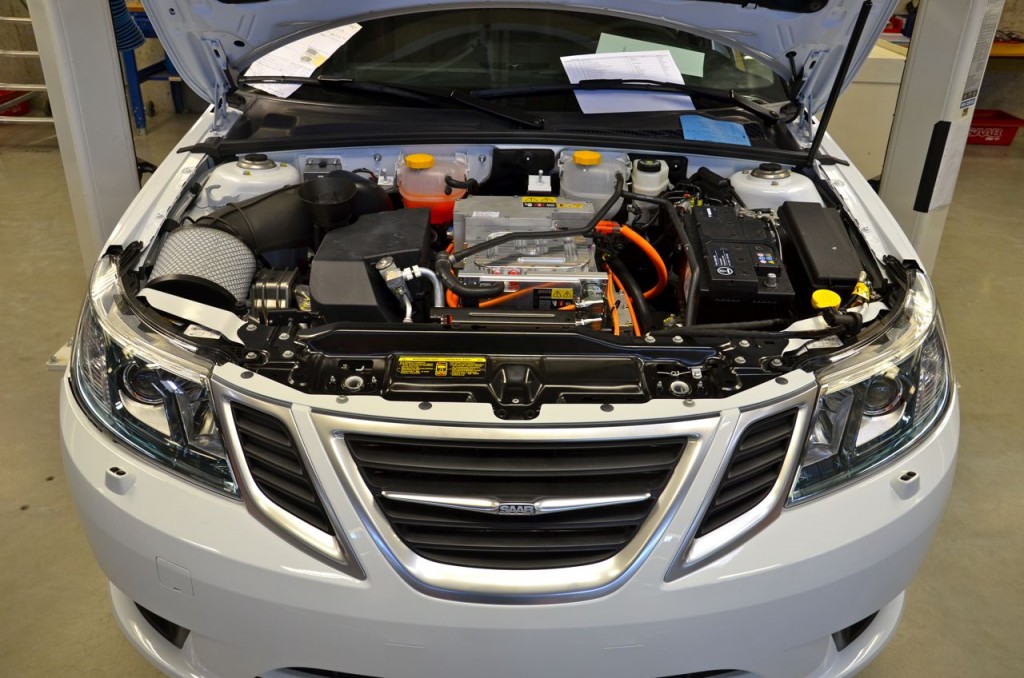After Saab Automobiles vanished from the U.S. market three years ago, the bankrupt remains of the Swedish brand and its factory in Trollhattan were bought by a Chinese company.
Its goal was to recast Saab as a maker of electric vehicles, and this week Swedish engineers presented a prototype of a Saab 9-3 running entirely on battery electricity, according to Just-Auto.
The company that owns Saab, called New Electric Vehicles Sweden (NEVS), was recently sued by an unpaid supplier, putting its future in some doubt.
DON'T MISS: Saab May Not Be Saved After All: New Owner May Be Forced Into Bankruptcy
To Saab fans and owners, that will seem like an echo of what happened to the company's last owner, Swedish Automobile, which collapsed into bankruptcy in December 2011 after purchasing the company the year before from its previous owner, General Motors.

Saab 9-3 EV electric prototype shown by NEVS, 2014
Nonetheless, the modified Saab 9-3 Aero Sedan is part of a series of prototype test vehicles to develop and refine the battery-electric adaptation of the Saab 9-3, first introduced in 2003 and based on some underpinnings with GM's Opel vehicles in Europe.
Limited production of gasoline-powered Saab 9-3s restarted last December and has continued sporadically this year as NEVS works to restart the Trollhattan factory, which had been idled for two years.
The Saab brand's "well-known performance and safety is maintained and we foresee a very good product for the market," said Stig Nodin, Saab's vice president of engineering and product development.

2014 Saab 9-3 Aero
"When we developed the Saab 9-3 Aero Sedan Model Year 14, we focused on enhancing the driving experience, safety and quality," he said.
"And the starting point for our development of the Electric Vehicle project was to maintain all the good attributes and characteristics."
The first 200 electric Saab 9-3 EVs were expected to head to China for on-road testing sometime this summer, but production halted again in May due to financial woes at NEVS.
ALSO SEE: NEVS Halts Electric Saab 9-3 Production Amid Short-Term Cash Problems
The lithium-ion battery pack, mounted under the cabin floor, contains cells from Beijing National Battery Technology, one of several green-tech enterprises owned by Kai Johan Jiang's company National Modern Energy Holdings Ltd.
Saab claims that full cabin space has been maintained, and that luggage space is unaffected by the retrofitted battery pack and electric-drive components, calling the 9-3 EV prototype "just as practical" as the Saab 9-3 Aero that resumed limited production under NEVS earlier this year.
Range from the battery pack is approximately 125 miles (200 km), and the electric motor powering the front wheels is rated at 100 kilowatts (140 horsepower).

Saab 9-3 EV electric prototype shown by NEVS, 2014
No energy capacity for the NEVS pack was released; a Saab 9-3 ePower electric prototype shown in late 2010 under GM's ownership used a 35.5-kilowatt-hour pack and a drive motor rated at 135 kW (184 hp).
Acceleration from 0 to 62 mph (0 to 100 km/h) is quoted at 10 seconds for the prototype, with a top speed limited to 74 mph (120 km/h).
NEVS hopes to use the prototype fleet of 9-3 EVs for further technical development of electric Saabs, as a reference for upcoming production electric cars, and to help the rest of the company understand the benefits and driving experience of electric vehicles.
_______________________________________________













